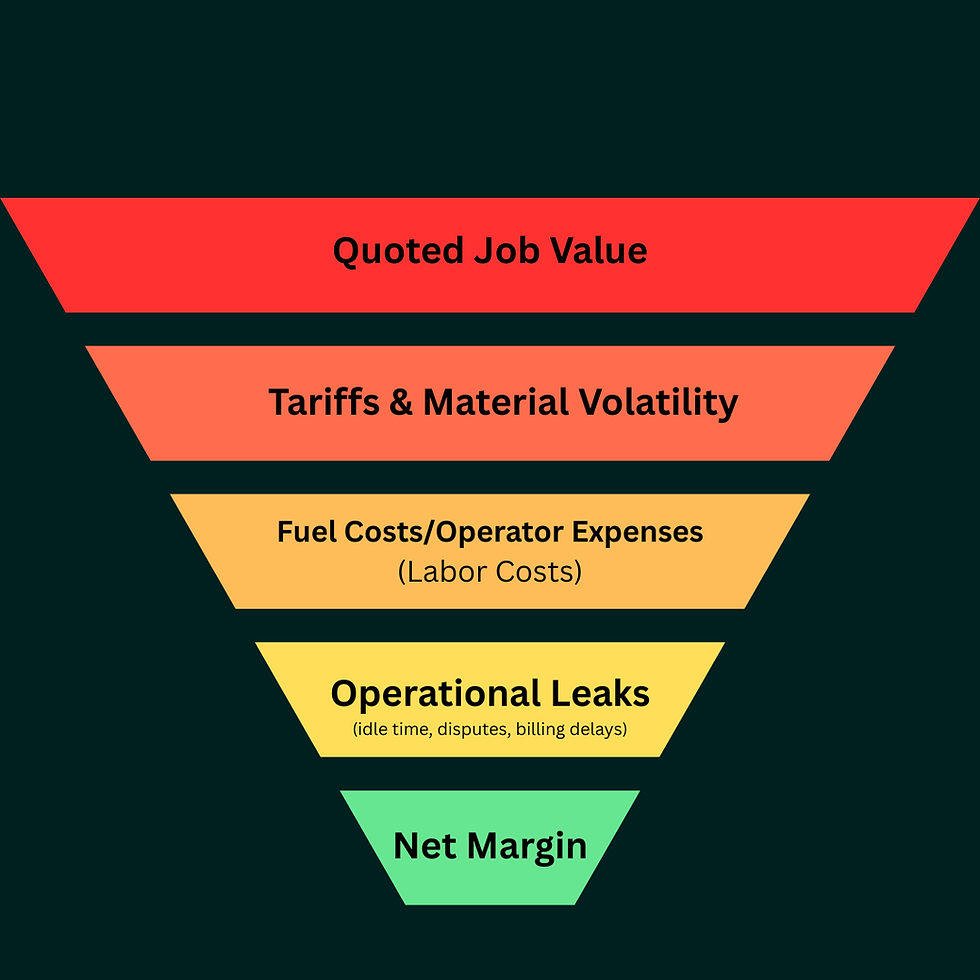Navigating Tariffs Without Losing Your Margins: A Playbook for Concrete Businesses.
- kanchan97
- Aug 22, 2025
- 3 min read
The Margin Squeeze Is Real.
Concrete businesses have always operated with thin margins, but today’s volatility has taken the pressure to new levels. Tariffs are rising and shifting without warning. Fuel costs swing week to week. Operators are harder to find and even more expensive to keep. On top of that, customers still expect firm quotes, even when your costs are changing constantly.
The result? Even businesses with steady work can feel like they’re running uphill, just to stay profitable. In this climate, protecting your margins isn’t just important — it’s survival.
The Hidden Impact of Tariffs on Margins
Tariffs don’t show up as a line item on your invoice, but they’re buried in every material cost you face. Steel, cement, parts, even replacement equipment can all spike overnight because of global trade shifts.
The tricky part? Margin loss often happens before the work even begins.
Outdated quotes that lock you into yesterday’s costs.
Fixed-rate agreements that leave no room for fuel or material escalations.
Verbal commitments that are impossible to enforce when disputes arise.
What looks like a profitable job on paper can turn into a break-even, or worse, lost revenue if you’re not quoting with volatility in mind.

Smarter Quotes: Your First Line of Defense
You can’t control tariffs or global supply chains — but you can control how you quote. Smart quoting is the fastest way to shield your margins from volatility.
A modern quote should:
Include all job costs upfront. Don’t forget fuel surcharges, idle time, and delivery delays.
Use templates with built-in markups. Consistency helps avoid underpricing.
Add expiry dates and escalation clauses. Don’t let a quote sit for months and turn into a liability.
Clearly define scope and surcharges. Avoid misunderstandings that eat into profits.
The companies winning in today’s market aren’t just quoting faster, they’re quoting smarter. They protect their margins before the first yard is poured.
Stronger Terms: Protecting Profitability in Volatile Times
Margins are too thin to rely on handshakes. Stronger terms provide the protection you need when tariffs, wages, or materials spike unexpectedly.
Practical ways to strengthen your terms:
Tariff escalation language. If material costs rise, you’re not locked into old prices.
Force majeure clauses. Cover yourself in cases of supply chain shocks or sudden regulatory changes.
Digital proof of delivery. Remove disputes by showing exactly when, where, and how work was completed.
Some owners fear tough terms will scare customers off. In reality, the best clients respect clarity. It shows professionalism and provides predictability for both sides.
Technology: The Margin Multiplier
While tariffs eat into costs, overhead is often the silent killer of margins. Hours lost to manual processes such as scheduling, dispatching, billing, payroll — add up fast.
That’s why more concrete businesses are adopting technology to tighten operations:
Automating quote-to-cash. Fewer days between job and invoice = faster cash flow.
Streamlining dispatch and scheduling. Reduce double-booking, deadhead miles, and idle operators.
Operator apps. Track every billed hour in real time, no more guesswork.
Centralized data. Monitor billed %, utilization, and job costing in one easy-to-use platform.
Every leak you plug is margin you get back. Even if tariffs rise, you can stay profitable by making the rest of your operation leaner and more efficient.

Small Changes, Big Impact.
Protecting margins doesn’t always require massive changes. Even small improvements like tightening dispatch habits, reducing non-billable hours, or digitizing job tickets can make a noticeable difference.
The key is discipline. Every hour saved, every mistake avoided, and every process streamlined directly protects your bottom line.
Building Resilience Into Your Business
Tariffs and volatility are out of your control. But your approach to quoting, terms, and operations is fully in your hands. By tightening these areas, you create resilience that protects your margins no matter what the market throws at you.
Smarter quotes stop losses before they start.
Stronger terms ensure fair compensation.
Technology plugs the overhead leaks draining profits.
Margins will always be tight in for the concrete business. But if you put systems in place now, you won’t just survive volatile times, you’ll thrive in them.
Final Thoughts
Navigating tariffs without losing your margins isn’t about luck. It’s about having a playbook. For concrete businesses willing to adapt, the opportunity is clear: build resilience, protect profitability, and scale with confidence.
Next Steps
Watch the webinar for the full discussion.
Book time to view the platform to see how Tough Commerce can transform your current operations.



Comments